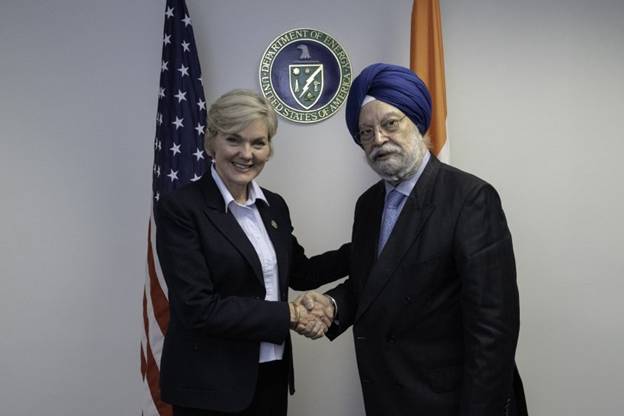The Strategic Clean Energy Partnership (SCEP) Ministerial, co-chaired by U.S. Energy Secretary Jennifer Granholm and India’s Minister of Petroleum and Natural Gas, Hardeep Singh Puri, took place in Washington D.C. on Sunday. The high-level meeting reviewed key initiatives, focusing on clean energy innovation, energy security, and accelerating the transition to clean energy.
The ministerial discussions highlighted joint efforts under five core pillars: Power and Energy Efficiency, Responsible Oil and Gas, Renewable Energy, Emerging Fuels and Technologies, and Sustainable Growth. Both sides praised the progress made in these areas and reaffirmed their commitment to further collaboration in driving clean energy transitions, building resilient supply chains, and fostering energy security.
The ministers recognized significant advances in emerging clean energy technologies, the integration of renewable energy, and efforts to decarbonize high-emitting sectors such as industry, buildings, and transportation. The formal launch of the Renewable Energy Technology Action Platform (RETAP) in August 2023 was hailed as a milestone, supporting collaboration in hydrogen, long-duration energy storage, offshore wind, and geothermal energy. Both countries emphasized the importance of research, development, and pilot projects to accelerate clean energy transitions.
In the hydrogen sector, the two nations welcomed the establishment of India’s National Centre for Hydrogen Safety and lauded their collaboration on the 2nd International Conference on Green Hydrogen held in September 2024. Granholm and Puri emphasized expanded bilateral cooperation on clean hydrogen research, development, and cost-reduction efforts, highlighting its use in sectors like transportation, including buses, tractors, and heavy machinery.
Energy storage also emerged as a critical component of future cooperation, with the formal launch of the Energy Storage Task Force. The task force will address policy frameworks, safety, manufacturing, and supply chain issues. The ministers welcomed projects like the technical feasibility study of a battery energy storage system (BESS) in Assam and BESS pilots in Haryana, as well as efforts to explore pumped storage as a long-term solution.
The modernization of India’s power distribution sector was also a key point, with support for smart metering deployment and power market reforms. The ministers lauded India’s ambition to achieve net-zero emissions for Indian Railways by 2030 and their collaboration in developing energy efficiency policies for railway facilities. They also celebrated India’s pioneering procurement of 1.5 GW of round-the-clock renewable energy.
Sustainable aviation fuel (SAF) cooperation took center stage, with both sides endorsing new engagement on SAF, including R&D and market development. The ministers highlighted the creation of joint reports on SAF and biofuels and the role of the Biofuels Task Force in advancing the sector.
In transportation, electrification efforts are set to expand with a focus on medium- and heavy-duty vehicles. The ministers applauded the implementation of the PM eBus Sewa scheme, which aims to deploy 10,000 electric buses across India. A series of workshops on electric freight and buses are also planned as part of the partnership.
Progress on carbon capture, utilization, and storage (CCUS) was another major point of discussion, following a workshop held in Delhi in August 2024. The two sides identified potential areas of cooperation on geologic carbon storage and regulatory frameworks.
The oil and gas sector also saw developments, with a focus on methane abatement through technical cooperation with India’s Directorate General of Hydrocarbons (DGH). The U.S.-India Partnership to Advance Clean Energy-Research (PACE-R) program, particularly the recently concluded UI-ASSIST initiative, was highlighted for advancing smart grid and energy storage technologies.
Both ministers underscored the importance of public-private dialogues in shaping policy frameworks, reducing the cost of clean energy technologies, and fostering commercial partnerships. In this context, they welcomed increased investments in clean energy markets, including Indian company Waaree’s recent investment in a 3 GW solar module manufacturing facility in Texas.
As both nations navigate the complexities of the energy transition, the ministers stressed the importance of capacity building and sharing best practices at all levels of government. They expressed optimism that the SCEP partnership would continue to drive innovation and strengthen clean energy supply chains, reinforcing the global fight against climate change.




















